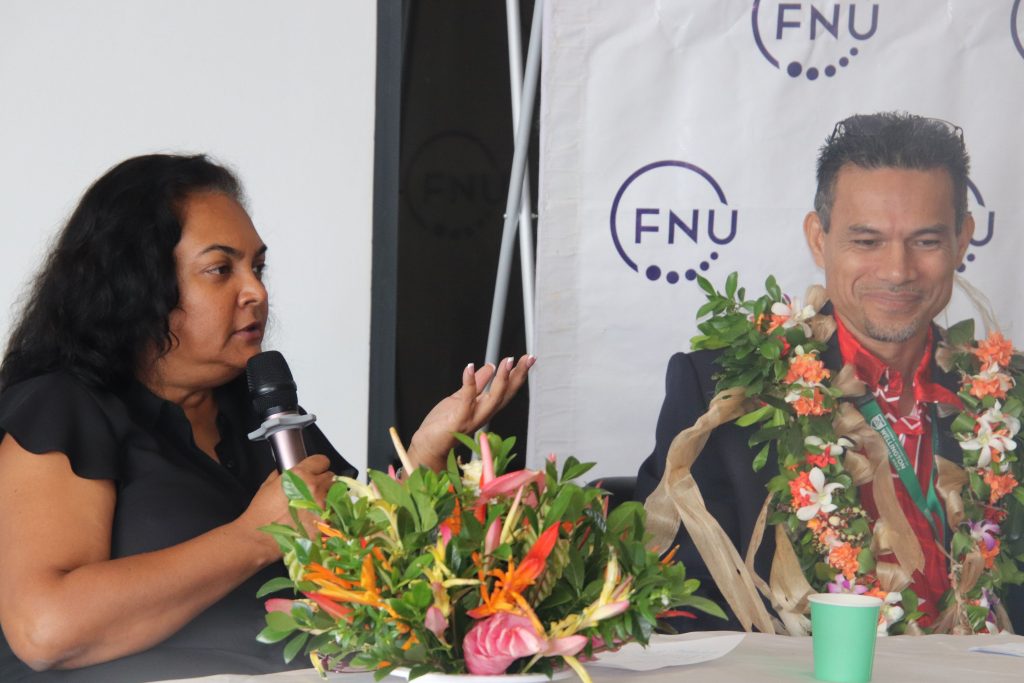

Fiji Labour Party’s Monica Raghwan (left) from the answering a question at the workshop.
Students, staff, and participants discussed women and youth representation and participation, and key learning outcomes from the recent general elections during workshops held at the Fiji National University (FNU) over the past two weeks.
Organised by FNU’s College of Humanities and Education (CHE), Department of Ethics and Governance, the Post-Elections Stakeholder Consultations is funded by the United Nations Development Programme (UNDP) as part of the Youth Voter and Elections Education Project that commenced last year.
Participants discussed observations and analysis of the 2022 General Elections, key issues raised by political parties and learnings for political parties and youth at the workshop which was held at the FNU Nasinu and Namaka campuses.
The workshops featured several key speakers. At the Nasinu campus workshop, speakers included Monica Raghwan from the Fiji Labour Party (FLP), Viliame Takayawa from the Social Democratic Liberal Party (SODELPA), former Fiji First candidate Jacob Abraham and the former politician and feminist Roshika Deo. At the Namaka workshop, speakers included Sandeep Narayan from FLP, Ben Daveta from SODELPA, Mereseini Baleilevuka from People’s Alliance Party (PAP) and Louchrisha Hussain from the Citizens’ Constitutional Forum (CCF).
Representatives from civil society organisations and university student body representatives also shared their views on the topics.
The Youth Voter and Elections Education Project relates to the fulfilment of the Sustainable Development Goal (SDG) Goal 16 on Peace, Justice, and Strong Institutions.
Chief Guest, UNDP Senior Elections Advisor, Daniel Hinchcliff emphasised the importance of elections in a democracy and encouraged citizens to engage in the electoral process.
“Elections are the foundations of democracy, and they provide the opportunity for you and all citizens to exercise your right to vote,” he said.
“In my election work and experience, I have witnessed amazing sacrifices the people have made in the name of democracy. Those people have proved to me that elections and democracy are something that you cannot ignore, they are important.”
“In Fiji, we have just witnessed the transformative power of elections. Through the ballot box, we have seen the peaceful transition of power from one government to another. This is a strong symbol of a healthy and vibrant democracy. However, the importance of elections go beyond the act of casting the vote. Your engagement is a critical aspect to any electoral process.”
CHE Acting Associate Dean TVET, Jerry Wong, highlighted that the post-election activities done by the College include stakeholder consultation workshops in Nasinu, Namaka, and Labasa, a post-election survey in the Central, Western, and Northern Divisions, and producing reports and publications on Fiji’s 2022 General Election.
Wong said universities had a responsibility to educate adults on voting and elections, and empowering youth interest and participation in elections could rejuvenate their interest in politics.
“FNU in collaboration with the UNDP, commenced the Youth Voter and Elections Education Project. The pre-elections activities comprised of eight Youth Voter and Elections education workshops. There were two workshops conducted at the FNU Nasinu campus, one at our Fiji Maritime Academy campus, two at the Natabua Campus and three workshops conducted at the Labasa Campus,” Wong shared.
“These activities contribute to the critical role that universities play in generating new knowledge in academic areas such as science, commerce, the arts, and the humanities. Such activities contribute to good governance and national dialogue toward the creation of peaceful and just societies around the world.”
According to the Project Coordinator and Convenor of the Post-Election Workshops Dr Mosmi Bhim, elections and voting are a key feature of democracy, while political parties and wider civil society are key stakeholders in the elections process.
“Citizens can take part in politics by expressing range of views individually and through diverse organisations, to inform political leaders of their opinions as well as to hold them accountable,” Dr Bhim said.
“The FNU’s post-elections workshops are part of efforts by academia to create safe spaces for sharing of information by the above stakeholders. The outcomes of the workshop will be utilised to create educational materials about democracy and elections.”
Student, Adicoka Valesu said the workshop provided her with insights and knowledge regarding the recent elections.
“The workshop was very informative, and I have learnt about women’s rights and the important role they play in politics. It also discussed how women can enter politics. Election and voting are an important thing and how we can exercise our rights in choosing the government,” she said.
“Such workshops will bring the youth together and it will encourage them to vote in the next election and exercise their rights.”